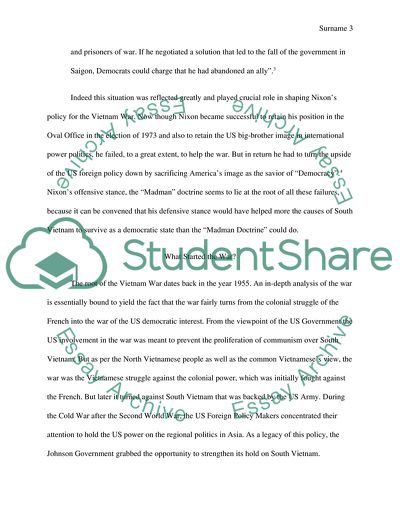Cite this document
(Analysis of the United States Failure in the Vietnam War Report Example | Topics and Well Written Essays - 1750 words, n.d.)
Analysis of the United States Failure in the Vietnam War Report Example | Topics and Well Written Essays - 1750 words. https://studentshare.org/history/1761016-why-did-the-united-states-fight-a-war-in-vietnam-and-why-did-it-fail-to-win-that-war-why-specifically-did-the-policies-of-the-johnson-and-nixon-administrations-fail-in-vietnam
Analysis of the United States Failure in the Vietnam War Report Example | Topics and Well Written Essays - 1750 words. https://studentshare.org/history/1761016-why-did-the-united-states-fight-a-war-in-vietnam-and-why-did-it-fail-to-win-that-war-why-specifically-did-the-policies-of-the-johnson-and-nixon-administrations-fail-in-vietnam
(Analysis of the United States Failure in the Vietnam War Report Example | Topics and Well Written Essays - 1750 Words)
Analysis of the United States Failure in the Vietnam War Report Example | Topics and Well Written Essays - 1750 Words. https://studentshare.org/history/1761016-why-did-the-united-states-fight-a-war-in-vietnam-and-why-did-it-fail-to-win-that-war-why-specifically-did-the-policies-of-the-johnson-and-nixon-administrations-fail-in-vietnam.
Analysis of the United States Failure in the Vietnam War Report Example | Topics and Well Written Essays - 1750 Words. https://studentshare.org/history/1761016-why-did-the-united-states-fight-a-war-in-vietnam-and-why-did-it-fail-to-win-that-war-why-specifically-did-the-policies-of-the-johnson-and-nixon-administrations-fail-in-vietnam.
“Analysis of the United States Failure in the Vietnam War Report Example | Topics and Well Written Essays - 1750 Words”. https://studentshare.org/history/1761016-why-did-the-united-states-fight-a-war-in-vietnam-and-why-did-it-fail-to-win-that-war-why-specifically-did-the-policies-of-the-johnson-and-nixon-administrations-fail-in-vietnam.


